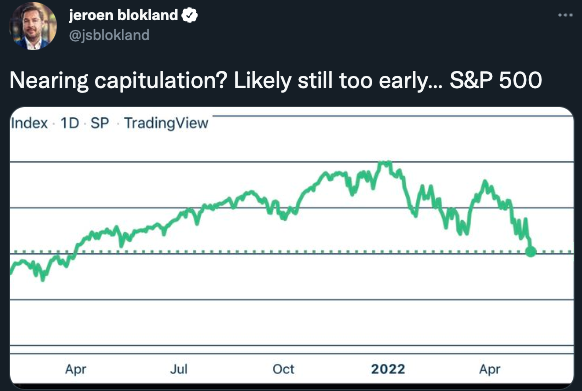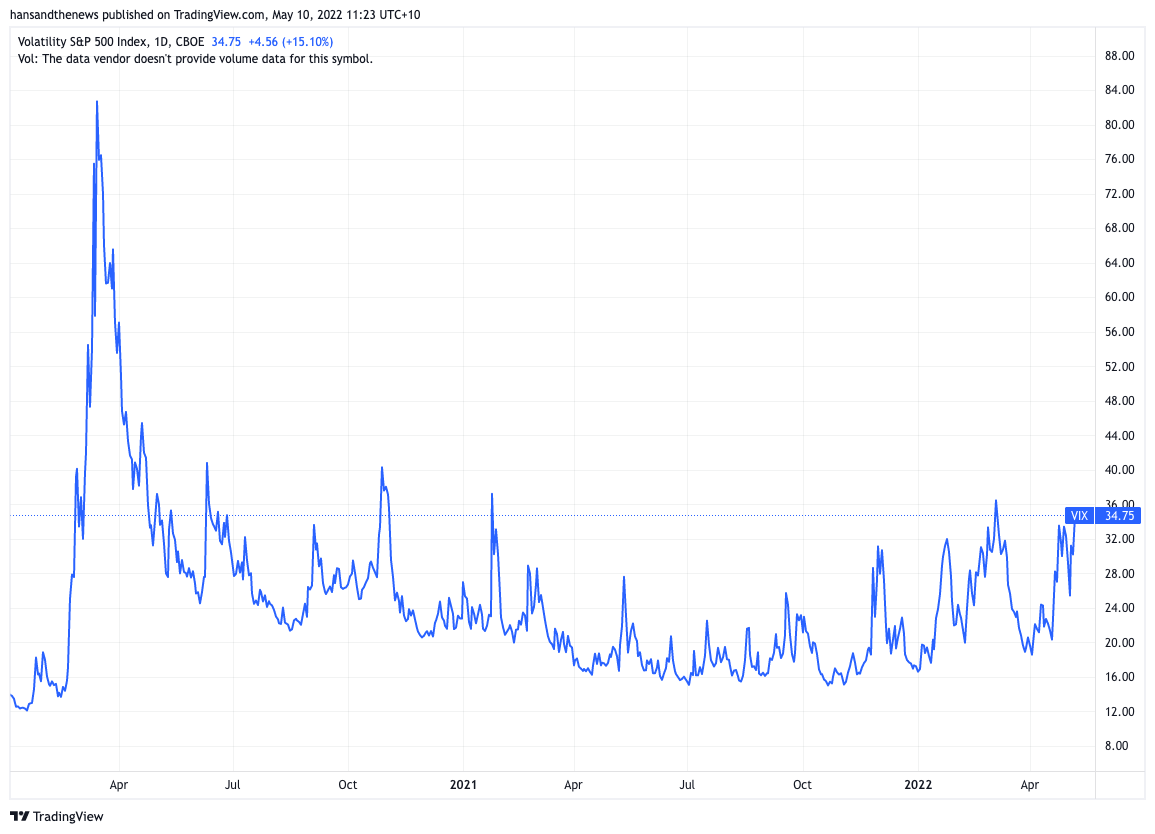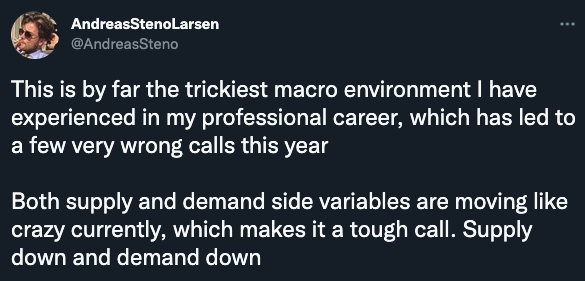How to guard your portfolio against bigger crashes
If there is any statistic that has made me widen my eyeballs of late, it's got to be this one.
The S&P/ASX 200 VIX (as of writing) has doubled in five months.
Put simply, points on the volatility index have doubled in the year to date so far. In the US, it's now not uncommon to see evenings where their equivalent volatility index soars 10-15% in one evening. That's leading some analysts to suggest the bottom is nowhere near yet for the stock market, only emphasised by the five straight weeks of losses we are seeing for the S&P 500.
One of those not seeing the bottom is Jeroen Blokland - now running his own shop 'True Insights' but formerly was head of multi-asset at Robeco.

One last note about the VIX where context could be useful - it's still not that high in comparison to the initial COVID-19 shock of March 2020 as this chart shows. While March 2020 was a total anomaly, it's interesting how March to May 2020 created the shortest recession in history because of the intense stimulus flood. Now the tap is being turned off, and a VIX at just shy of 35 is leading the equity market to crater.

So are there any other ways to stem the bleeding? David Lane of Ord Minnett joined me for a conversation about how to protect your portfolio in a market where the only direction (for now) is south.
This time is different
David wasn't caught off guard by the timing around a big drawdown. The team at Ord Minnett were selling their positions in US equities six months ago and took their profits on the ASX miners not long thereafter. However, he did admit that he is surprised by the veracity of the selling action.
Long term, however, David says few fundamentals have changed - and that should mean excellent news for most investors.
"From an earnings perspective, a lot hasn't changed. Yes, those share prices fall but the fundamental reasons why we bought are still the same," David says. He's reminding his clients to stick to diverse portfolios and hold onto a bulk of cash for when the bleeding stems. For reference, Ord Minnett's own benchmark asset allocation strategies (run by colleague Malcolm Wood) are now holding at least 15% cash.
A tweet to consider
Before we move on to the next section of this wire, consider the tweet which I've put here below from Andreas Steno Larsen - chief economist and head of research at Heimstaden. Andreas has a wealth of knowledge on everything macro - stemming mostly from more than a decade at Nordea Bank. But even he's eating some humble pie of late.

David has an even longer memory than Andreas - he started in the markets in 1992, well before the dot com bubble and the Global Financial Crisis. So does it get any harder than what we are seeing right now?
"I would say that portfolios are much more diversified than in 2008," David recalls. "Before 2008, there was a much heavier weighting to Australian equities. This time around, there is a greater allocation towards international, infrastructure assets."
Drilling into derivatives
While there are four main kinds of derivatives out there (futures, forwards, swaps and options) - it's the last one that David is most concerned with for clients. At this moment, David isn't buying protection puts for indices but rather, is wanting to capitalise on select stock prices at cheaper levels.
"One is to buy a call option if you like a stock but you're not sure whether you think it's at the bottom," David notes. "That's a lower risk than buying the stock because you'll only lose the premium you've paid - giving you the chance to build the portfolio over a period of time."
On the local bourse, David nominates three names which are presenting attractive "options action" at this time - National Australia Bank (ASX:NAB), Macquarie Group (ASX:MQG) and BHP (ASX:BHP). Even staying pat (that is, not moving your money at all) is a good option if you can think long term, stomach the losses and don't have any spare cash to hunt for bargains.
The one thing he doesn't recommend doing?
"The worst thing is to do right now is to panic," David says.
Are we at peak exhaustion?
One last thing to consider - markets have been in free fall for several weeks but where there are no more sellers, could the market actually rebound if you hold on long enough? Trader Simon Ree published a piece on LinkedIn talking about seller exhaustion, pointing out that these mass selloffs in the US stock market are unusual. So unusual that it's only happened 12 times in the last 60 years.
However, it's also not unusual to see gains after the worst of the selling has passed. Of the 12 occurrences, 11 were followed by relief rallies.
David argues we are nearer to the peak of the selling than we are to the trough. While it's always next to impossible to pick the bottom itself, he thinks clients will start to buy good quality companies at cheap prices in the not too distant future.
"Where you've got people that have 50% cash, they're not looking to sell - they're looking to buy. I think people will start to do that reasonably soon," David says - even pointing to quality tech companies on the NASDAQ.
Never miss an insight
If you're not an existing Livewire subscriber you can sign up to get free access to investment ideas and strategies from Australia's leading investors.
I'll be in charge of asking the questions to Australia's best strategists, economists, and fixed income fund managers. If you have questions of your own, flick us an email: content@livewiremarkets.com
2 topics
3 stocks mentioned

